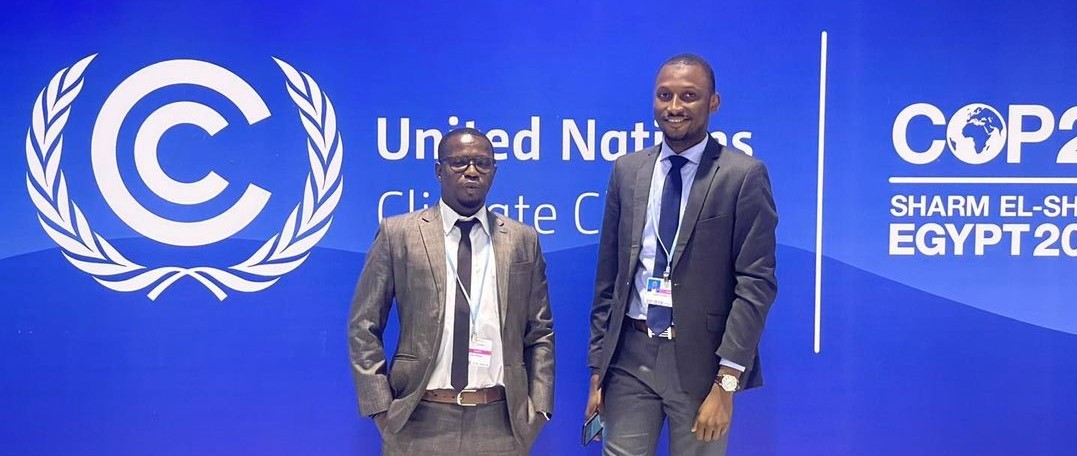
Interview with Green Transformation 2050
Published on 26 January 2023Greentransformation2050 (GT2050) is a development NGO under Guinean law, specialised in the environment and the fight against climate change, which intervenes in the sectors of conservation and management of protected areas. Its President, Alpha Kaloga, and its Director, Alpha Diallo, who have just returned from COP 27, talk to us about the place of African civil society in the global debate on environmental preservation.
GT2050, represented by its President and Director, has just returned from COP27 in Egypt, what made it possible for your NGO to be represented?
The President of GT2050 is the lead negotiator for Africa on climate change loss and damage. In this sense, he spent most of his time negotiating the three COP27 agenda items on loss and damage. As a result, the NGO’s activities were monitored by the Executive Director.
Indeed, the Executive Director of GT2050 has recently joined the New Generation of Negotiators (NGN) which is a group of young negotiators working together under the Climate Leadership Initiative (CLI) with the support of the Loss and Damage Collaboration (LDC) and the International Institute for Environment and Development (IIED) as well as many other organisations. NGN focuses on topics such as finance, adaptation, Action for Climate Empowerment (ACE), technology, Article 6 of the Paris Agreement and transparency, gender, agriculture, etc. Thus, as a member of the Loss and Damage Youth Coalition (LDYC) the Executive Director was able to benefit from funding for his participation in COP27 through the Heinrich Böll Stiftung (HBF).
How did you perceive the presence and consideration of African civil society in the decisions at this COP27? What made that CSOs were considered or not?
The 27th Conference of the Parties (COP) held in Sharm El-Sheikh was the place to interrogate the greatest global climate concerns and to specifically invite African countries to essentially address the problems related to loss and damage. Every objective is a priority for those on the front line of climate change in African and other vulnerable developing countries. The best way to bring these concerns to the table is to involve different actors (state and non-state) from developed and developing countries to come back to the most critical issues related to loss and damage, and other issues that the COP is addressing.
It was realised that African civil society organisations have little idea of how African states are addressing the issues of loss and damage associated with the impact of climate change at the local level. For African states to truly design policies that are responsive to local contexts, NGOs need to be skilled and equipped to alert on slow onset events and communicate on displacement caused by internal climate disturbances that often go unreported.
What role do you see for African civil society following the COP27? Will you continue to be active at this level?
We answer in the affirmative that as an African NGO, GT2050 intends to actively participate in the various exchanges at national and international levels for more positive impact and fundraising opportunities.
For African Civil Society Organisations (CSOs) to be active at this level, their role could be to:
– Identify and describe the type of technical assistance needed to address loss and damage at national and regional levels.
– Promote technical assistance at the international level, which will require urgent and immediate support, including funding and capacity building.
– Appoint focal points for loss and damage, and these focal points should drive progress and act as channels for technical assistance requests from affected parties.
– Organise African CSO leadership campaigns on the development of an advisory board, which will be a convening/secretariat body, among other things, and they should define their roles and responsibilities, considering the perspectives, needs and priorities of developing countries, including those in Africa in particular.
– Open a window of opportunity for the implementation of actions for financing loss and damage with other relevant stakeholders from abroad.
– Also discuss the quality, quantity and accessibility of funding required for the Santiago Network to function and provide technical assistance, while considering the needs and priorities of African parties.
As far as your activities in Guinea are concerned, you have good news on the funding side, can you tell us a bit more ?
The NGO GT2050 is the new recipient of two grants from the Stichting Otterfonds Vlietsingel and the Loss and Damage Youth Coalition (LYDC-Grant) to implement its activities.
These two projects, with a budget of approximately 85,000 Euros, will be implemented respectively in the periphery of the Upper Niger National Park (LNNP) in the prefectures of Faranah, Dabola and Kouroussa; and the Kabaki region including the areas occupied by the displaced climatically displaced people who have lost their agricultural land as a result of the surrender of the dam.
The first project aims to contribute to the sustainable management of the natural resources of the Upper Niger National Park through better participation of local communities. This project is the logical continuation of a first project funded by the French Committee of IUCN (PPI) in 2020 and 2021, which aimed to contribute to the sustainable management of natural resources through the active participation of local communities.
The second, which will be implemented in a coastal area, aims to increase community resilience due to unexpected internal climate migration in Lower Guinea, through relocation and resettlement of affected communities from Kabaki’.
In terms of activities, we plan to raise awareness and build capacity of Civil Society Organisations (CSOs) on losses and harms due to climate change impacts. We also plan to financially support the relocation and resettlement of affected communities by constructing alternative livelihoods and shelters, latrines and boreholes for displaced families in one of their new homes.
The expected impact is to influence policy and mobilise Guinean voices on the loss and damage resulting from the adverse effects of climate change.
Please visit our Facebook page to follow our activities: https://www.facebook.com/gt2050
Fore more information :
https://nypost.com/2022/11/19/cop27-countries-poised-to-make-deal-on-historic-climate-fund/amp/